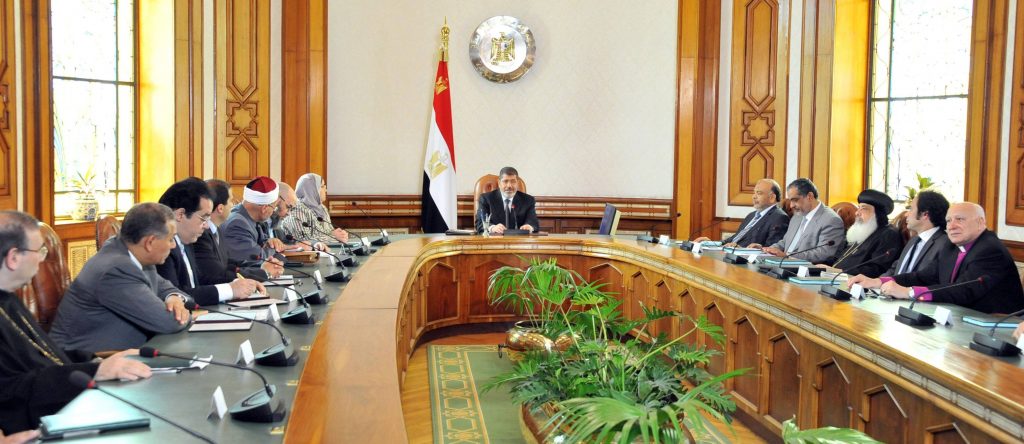
Catch up on the latest out of Egypt every week, with analysis, news updates, photos, videos, and more.
Quotes of the Week
“The key test of an association law is whether organizations will be able to operate freely, without interference from the executive, and independently, with access to funding to enable their survival.” Heba Morayef
“The main philosophy behind the law is to help transform Egypt from a police state into a civil, democratic state governed by the rule of law.” Khaled al-Qazzaz
Egypt in the News
- Merkel questions aid to Egypt; US State Department ‘clarifies’ military aid
- Mob killings in Damietta and Mounifeya on Sunday
- Morsi adviser blames IMF for delaying Egypt $4.8 billion loan agreement
- Mubarak’s retrial on murder charges adjourned to July 6; court orders sons’ release
- Egypt ‘war’ talk raises Ethiopia Nile dam stakes; FM to visit Addis Ababa
- Egyptian Christian teacher convicted of blasphemy
- Police won’t protect Brotherhood HQ on 30 June: Interior minister
- Culture Ministry sit-in continues, Salafis vow to disperse protest
- Egypt govt agrees on draft law for police; Shura passes amended political participation bill
- Tagarod calls for sit-in to counter June 30 rallies; Tamarod ending petition drive June 20
- Former State Security head, forty others acquitted
- Culture Ministry protest attacked
- Egypt to see blackouts for three years at least: Experts
- Ethiopia expects Egypt talks over Nile Dam, says won’t back down
- Brotherhood, Rebel swap blame for Alexandria clashes
- Political forces prepare for June 30
- Morsi leaves mosque after protesters’ cries
- ‘Tamarod Week’ commences; Clashes break out in 6th of October city
- Egypt official says citizens free to join fight in Syria; Gov’t says it was a misquote
- US ambassador warns against unemployment crisis in Egypt
In-depth
Uncivil Society | Heba Morayef, Foreign Policy
In a concise piece on Foreign Policy, Heba Morayef discusses the implications of the current draft NGO law and how it will not prevent similar verdicts to the politically motivated verdict of June 4.
“The presidency’s draft would reinforce and formalize state control over NGOs by empowering the authorities to deny them access to both domestic and international funding.”
“The presidency’s draft law would give the Egyptian government unlimited power to object to any group’s domestic fundraising or its right to obtain foreign funds.”
“The draft law would also give the authorities complete discretion to object to any of the activities of Egyptian and international organizations. If the organization did not comply, the government could take it to court.”
We’re Not Building a ‘Police State’ | Khaled al-Qazzaz, Foreign Policy
Khaled al-Qazzaz also writes about the current NGO trial and draft law seeking to contradict the claims that the law will limit the freedom and independence of the civil society.
“The bill permits NGOs to freely collect donations from Egyptians inside and outside Egypt, and from foreign residents in Egypt. It requires only "notification" in case of foreign donations.”
In defence of the decision to require NGOs to ‘notify’ the funds they receive, he stated that, “It is as if the statement’s authors are seemingly calling for the unrestricted flow of foreign funding into Egypt, without any tracking by the government. This contradicts international norms of regulating foreign funding, which primarily aims to avoid the possibility of laundering terrorist money.”
Also of Interest:
Blasphemy in New and Old Egypt (Middle East Institute) By Mahmoud Salem
Ten Similarities Between Morsi and Erdogan (Al-Monitor) By Mustafa al-Labbad
Videos
Congressional Hearing on the NGO Trial. Watch below for the testimonies and hearing.
This Day in History
On June 14, 2012, the Egyptian Courts dissolved the Islamist-led parliament. Reactions varied throughout the country. Some believed it to be old regime judges (appointed under ousted Mubarak) clinging to power and a military coup. This came two days before the presidential election run offs.
“The rulings by Egypt’s Supreme Constitutional Court were quickly condemned as a “coup” by Islamists, liberals and scholars. The court’s action, coming two days before a presidential runoff, set up a showdown with the Islamists who controlled Parliament.” NYT
“All day Thursday, military armored vehicles circulated through Cairo’s streets playing patriotic songs as soldiers passed out leaflets urging passers-by to vote in the runoff election. Plastered on the side of their vehicles were posters saying "the army and the people are one hand." AP
Cartoon

Translation:
"How is he not cultured? He wrote an article and became the "Culture Minister." One more article and he will will be the "Supreme Guide." Cartoon: Youm7
Photo: Egyptian Presidency
Image: Ethiopia%20Crisis.jpg
